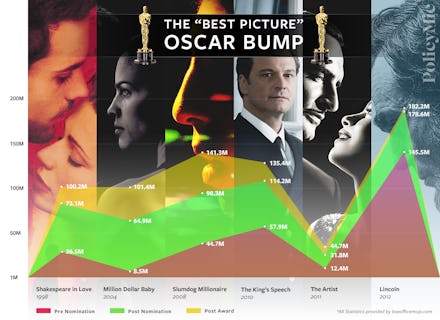The Economics Of the Oscars, In Two Quick and Easy Charts

It turns out the Oscars actually matter more than anyone thought.
In fact, it completely changes which movies the American public sees, whether or not a studio stays in business, and which films will be remembered. It's called the "Oscar Bump" and it's a force to be reckoned with:
It isn't just glitz and glamour — it's the economics of movie history.
These movies have come to define us in the past two decades, and it's thanks almost entirely to the sheer economic force of the Oscar. The King's Speech doubled its revenue in the period between its nomination and its exit from theaters, while Million Dollar Baby jumped from $8.5 million before its nomination, to $64.9 million before it even won on Oscar night — before it raked in more than 10 times its pre-nomination take. Dark horse contender Slumdog Millionaire, a film that gave hope to millions in America one year into the Great Recession, earned an almost $100 million spike following its nomination and win.
Without this award, these films that have defined us would have risked obscurity. (Unless, of course, you're Lincoln — but when a film comes out about the man who ended slavery, directed by the man who made E.T., and starring Daniel Day-Lewis, it's practically already been nominated for Best Picture five times over.)
The Oscars influence every aspect of a film's success. Nominations and wins also impact the reach of a film. If a little-known film is nominated for a big award, it immediately spreads across the nation to match the rising demand for tickets. Before An Education received a Best Picture nomination in 2010, it was only being screened in 50 U.S. theaters. After receiving three Oscar nods, it was showing in 800.
And every award influences a film's reach differently. Economists can even break down how much additional revenue a film can expect based the categories in which it is nominated. Oddly, films nominated for Supporting Actress experience a drop in box office revenue (sorry, J Law)
Image Credit: Boxofficequant.com
So the next time someone questions your desire to force all your friends to dye your carpet red, dress up, and watch a 3-hour award show, show them this chart.
The Oscar matters. And Oscar season is upon us once again.